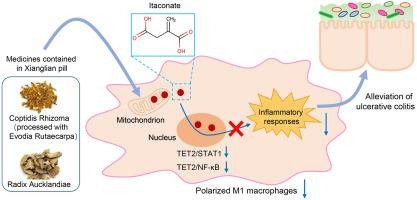香连丸通过调节能量代谢产物伊他康酸抑制巨噬细胞M1极化,从而缓解溃疡性结肠炎。
IF 6.7
1区 医学
Q1 CHEMISTRY, MEDICINAL
引用次数: 0
摘要
背景:香连丸(XLP)是一种传统中药,被广泛用于治疗溃疡性结肠炎(UC)。目的:本研究旨在探讨香连丸治疗溃疡性结肠炎的作用机制以及M1巨噬细胞极化在这一过程中的作用:研究设计:使用UC小鼠进行体内实验,同时使用RAW264.7细胞进行体外实验:方法:给小鼠注射3%硫酸葡聚糖诱导UC模型,然后用XLP治疗。评估组织病理学和促炎细胞因子的变化。通过流式细胞术检测肠系膜淋巴结中M1巨噬细胞的水平。使用能量代谢组学检测法分析了结肠代谢物水平。为了评估伊它康酸的影响,采用了体内(小鼠)和体外(RAW264.7 细胞)模型。免疫荧光染色用于测量 TNF-α、IL-6 和 iNOS 的表达水平,而 qRT-PCR 则用于量化 TET2、STAT1 和 Nfkbiz 的 mRNA 水平:结果:XLP减轻了溃疡性损伤,降低了结肠中TNF-α和IL-6的水平,还下调了M1巨噬细胞的水平,调节了能量代谢状态。具体而言,XLP能明显增加结肠组织中的ITA水平,而这种增加与M1巨噬细胞水平的降低和XLP治疗后UC的缓解有明显关联。此外,ITA还直接抑制了巨噬细胞从M0向M1表型的极化,并降低了TNF-α、IL-6和iNOS的水平。此外,ITA通过抑制TET2/STAT1和TET2/NF-κB信号通路,降低了M1巨噬细胞的炎症反应:结论:XLP可通过提高能量代谢产物ITA的水平来抑制M1巨噬细胞的极化,从而治疗UC。本文章由计算机程序翻译,如有差异,请以英文原文为准。

Xianglian pill alleviates ulcerative colitis by inhibiting M1 macrophage polarization via modulation of energy metabolite itaconate
Background
Xianglian pill (XLP) is a traditional Chinese medicine (TCM) that is widely used to treat ulcerative colitis (UC). However, its mechanism of action in UC is unclear.
Purpose
This study aimed to investigate the mechanism of action of XLP in treating UC and role of M1 macrophage polarization in this process.
Study design
In vivo experiments were performed using UC mice while in vitro experiments were conducted using RAW264.7 cells.
Methods
Mice were administered 3 % dextran sulfate to induce UC model and then treated with XLP. Changes in histopathology and pro-inflammatory cytokines were evaluated. The levels of M1 macrophages in mesenteric lymph nodes were detected by flow cytometry. Colon metabolite levels were analyzed using an energy metabolomic assay. To assess itaconate's impact, both in vivo (mice) and in vitro (RAW264.7 cells) models were employed. Immunofluorescence staining was used to measure the expression levels of TNF-α, IL-6, and iNOS, while qRT-PCR was utilized to quantify the mRNA levels of TET2, STAT1, and Nfkbiz.
Results
XLP alleviated ulcerative damage and reduced TNF-α and IL-6 levels in colon, and also downregulated the levels of M1 macrophages and modulated the state of energy metabolism. Specifically, XLP significantly increased ITA level in colonic tissue and this increase was significantly associated with decreased levels of M1 macrophages and alleviation of UC following XLP treatment. Moreover, ITA directly suppressed the polarization of macrophage from M0 to M1 phenotype, accompanied by the decrease of TNF-α, IL-6, and iNOS levels. Further, ITA decreased inflammatory responses in M1 macrophage by inhibiting the TET2/STAT1 and TET2/NF-κB signaling pathways.
Conclusion
XLP can treat UC by suppressing M1 macrophage polarization via increasing the level of energy metabolite ITA.
求助全文
通过发布文献求助,成功后即可免费获取论文全文。
去求助
来源期刊

Phytomedicine
医学-药学
CiteScore
10.30
自引率
5.10%
发文量
670
审稿时长
91 days
期刊介绍:
Phytomedicine is a therapy-oriented journal that publishes innovative studies on the efficacy, safety, quality, and mechanisms of action of specified plant extracts, phytopharmaceuticals, and their isolated constituents. This includes clinical, pharmacological, pharmacokinetic, and toxicological studies of herbal medicinal products, preparations, and purified compounds with defined and consistent quality, ensuring reproducible pharmacological activity. Founded in 1994, Phytomedicine aims to focus and stimulate research in this field and establish internationally accepted scientific standards for pharmacological studies, proof of clinical efficacy, and safety of phytomedicines.
 求助内容:
求助内容: 应助结果提醒方式:
应助结果提醒方式:


